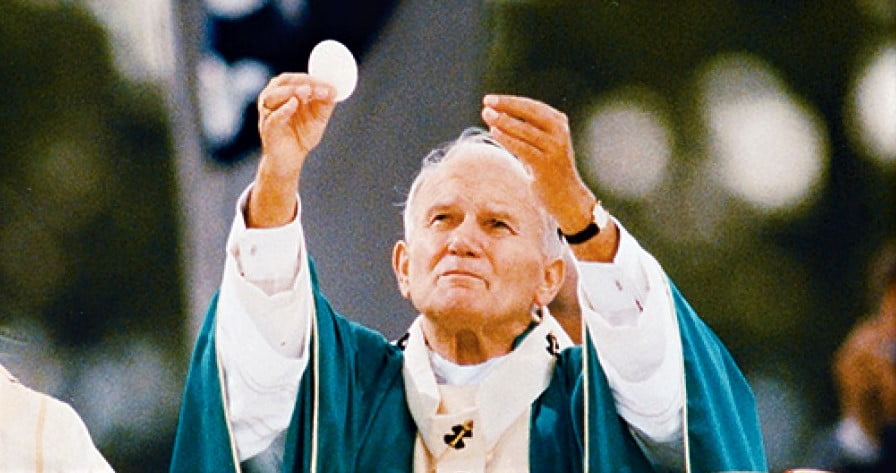
COULD CATHOLICS IN FREE UNIONS OR CIVIL MARRIAGES RECEIVE HOLY COMMUNION?
THE CATHOLIC TEACHING IN THE WORDS OF ST. JOHN PAUL II.COULD CATHOLICS IN FREE UNIONS OR CIVIL MARRIAGES RECEIVE HOLY COMMUNION?
THE CATHOLIC TEACHING IN THE WORDS OF ST. JOHN PAUL II.
THE CATHOLIC TEACHING IN THE WORDS OF ST. JOHN PAUL II.
THE CATHOLIC TEACHING IN THE WORDS OF ST. JOHN PAUL II.
COULD CATHOLICS IN FREE UNIONS OR CIVIL MARRIAGES RECEIVE HOLY COMMUNION?
THE CATHOLIC TEACHING IN THE WORDS OF ST. JOHN PAUL II.COULD CATHOLICS IN FREE UNIONS OR CIVIL MARRIAGES RECEIVE HOLY COMMUNION?
THE CATHOLIC TEACHING IN THE WORDS OF ST. JOHN PAUL II.COULD CATHOLICS IN FREE UNIONS OR CIVIL MARRIAGES RECEIVE HOLY COMMUNION?
THE CATHOLIC TEACHING IN THE WORDS OF ST. JOHN PAUL II.COULD CATHOLICS IN FREE UNIONS OR CIVIL MARRIAGES RECEIVE HOLY COMMUNION?
THE CATHOLIC TEACHING IN THE WORDS OF ST. JOHN PAUL II.
THE CATHOLIC TEACHING IN THE WORDS OF ST. JOHN PAUL II.
THE CATHOLIC TEACHING IN THE WORDS OF ST. JOHN PAUL II.
THE CATHOLIC TEACHING IN THE WORDS OF ST. JOHN PAUL II.
THE CATHOLIC TEACHING IN THE WORDS OF ST. JOHN PAUL II.
81. This means unions without any publicly recognized institutional bond, either civil or religious. This phenomenon, which is becoming ever more frequent, cannot fail to concern pastors of souls, also because it may be based on widely varying factors, the consequences of which may perhaps be containable by suitable action.
81. This means unions without any publicly recognized institutional bond, either civil or religious. This phenomenon, which is becoming ever more frequent, cannot fail to concern pastors of souls, also because it may be based on widely varying factors, the consequences of which may perhaps be containable by suitable action.
Some people consider themselves almost forced into a free union by difficult economic, cultural or religious situations, on the grounds that, if they contracted a regular marriage, they would be exposed to some form of harm, would lose economic advantages, would be discriminated against, etc. In other cases, however, one encounters people who scorn, rebel against or reject society, the institution of the family and the social and political order, or who are solely seeking pleasure. Then there are those who are driven to such situations by extreme ignorance or poverty, sometimes by a conditioning due to situations of real injustice, or by a certain psychological immaturity that makes them uncertain or afraid to enter into a stable and definitive union. In some countries, traditional customs presume that the true and proper marriage will take place only after a period of cohabitation and the birth of the first child.
The pastors and the ecclesial community should take care to become acquainted with such situations and their actual causes, case by case. They should make tactful and respectful contact with the couples concerned, and enlighten them patiently, correct them charitably and show them the witness of Christian family life, in such a way as to smooth the path for them to regularize their situation. But above all there must be a campaign of prevention, by fostering the sense of fidelity in the whole moral and religious training of the young, instructing them concerning the conditions and structures that favor such fidelity, without which there is no true freedom; they must be helped to reach spiritual maturity and enabled to understand the rich human and supernatural reality of marriage as a sacrament.
The pastors and the ecclesial community should take care to become acquainted with such situations and their actual causes, case by case. They should make tactful and respectful contact with the couples concerned, and enlighten them patiently, correct them charitably and show them the witness of Christian family life, in such a way as to smooth the path for them to regularize their situation. But above all there must be a campaign of prevention, by fostering the sense of fidelity in the whole moral and religious training of the young, instructing them concerning the conditions and structures that favor such fidelity, without which there is no true freedom; they must be helped to reach spiritual maturity and enabled to understand the rich human and supernatural reality of marriage as a sacrament.
The People of God should also make approaches to the public authorities, in order that the latter may resist these tendencies which divide society and are harmful to the dignity, security and welfare of the citizens as individuals, and they must try to ensure that public opinion is not led to undervalue the institutional importance of marriage and the family. And since in many regions young people are unable to get married properly because of extreme poverty deriving from unjust or inadequate social and economic structures, society and the public authorities should favor legitimate marriage by means of a series of social and political actions which will guarantee a family wage, by issuing directives ensuring housing fitting for family life and by creating opportunities for work and life.
c) Catholics in Civil Marriages
c) Catholics in Civil Marriages